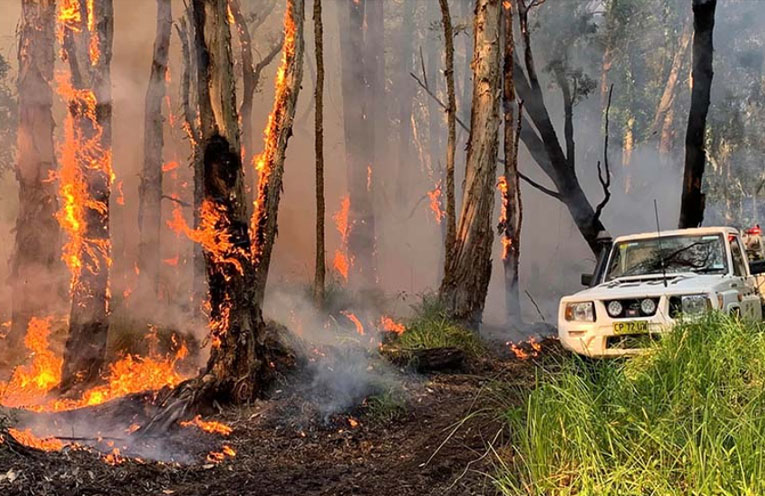FARMERS and rural landholders can now register to use Farm Firefighting Vehicles (FFVs) to respond to emergency bushfires near their property.
On Wednesday the NSW Government launched a conditional registration scheme to enable typically unregistered FFVs to be used legally and under the protection of insurance.
FFVs are commonly small trucks, utes or trailers with fixed water, pumps or fire management equipment, kept on farms to be rapidly deployed in the event of a fire.
The move follows two previous trials of around 350 FFVs.
The new scheme offers a lower cost conditional registration, which includes inspection for a light vehicle and the issuing of a licence plate expected to be a maximum of $209.
The cost for conditional registration will drop after the first year with the cost, including an inspection estimated at $126 (or $75 when inspection not required), subject to CPI and CTP increases.
Under the scheme, vehicles will be subject to the following requirements:
● Vehicle inspections as per the Authorised Inspection Scheme to establish registration, with inspection required every second year and registration to be renewed annually.
● Firefighting equipment must be permanently and securely attached to the vehicle.
● Vehicles must only be used for emergencies, not regular operations.
● May use roads up to 50km away from garaging addresses east of the Newell Highway, with no distance limit from garaging addresses west of the Newell Highway.
Minister for Roads Jenny Aitchison said, “We know that in many regional areas, farmers are often the first on scene at bushfires.
“This change is about ensuring farmers and other road users are safe when they respond to bushfire emergencies.
“During the 2019-2020 bushfires, I spent a lot of time with farmers, tourism operators and other members of regional and rural communities who were so badly impacted by that catastrophic bushfire season.
“I heard firsthand stories of the heroism and bravery shown by farmers standing side-by-side with our RFS and other emergency services to fight bushfires.
NSW Rural Fire Service (RFS) Commissioner Trent Curtin said the reform comes at a crucial time, with most of the state entering the Bush Fire Danger Period last week.
“Farmers know their land better than anyone, and when a fire starts nearby their quick action can make all the difference,” he said.
“This reform will continue the strong relationship between landholders and the RFS, leveraging all available resources and the expertise and dedication of farmers in safeguarding our communities.”
NSW Farmers’ President Xavier Martin said the new scheme was progress on solving the problem facing farmer volunteers after years of advocacy.
“These vehicles are lightning quick at getting to fires and getting them under control – but it’s simply not practical to register these units when they’re primarily used on farm for just a few months each year,” Mr Martin said.
“A more reasonable method to conditionally register these units for their specific purpose, so they can be used legally and under the protection of third-party insurance, is much needed – and this is a step towards that.”
With farmers able to apply to register their units under the scheme from 7 October, Mr Martin said NSW Farmers would monitor the scheme to ensure it was fit-for-purpose for farmers across the state.
“There’s still conditions around distance, permanently attached firefighting equipment and vehicle inspections (including costs) that must be met as part of the scheme, so it’s certainly not a perfect solution, but this is an important starting point after two trials,” Mr Martin said.
“It has taken a long time to get here and this scheme has got to work for our farmer volunteers, who are the ones that use these units to fight fires and protect not just their farms, but their communities too.”
While acknowledging the move, the NSW Nationals called out delays in implementing the scheme, saying the announcement came after “two years of sustained pressure by the Opposition”.
Shadow Minister for Emergency Services Gurmesh Singh said the “commonsense change” is a good start but more needs to be done to reduce red tape.
“There are still questions around some of the stringent guidelines,” he said.
“We don’t want a situation where people are being rejected for things like needing to have the equipment permanently attached, which might not be practical for a farmer in a day to day sense.”
Shadow Minister for Regional Transport and Roads Dave Layzell said the measure will save farmers the full registration fee but could go further.
“Farm Fire Fighting Vehicles tend to be used around the farm and not on public roads, which is why the conditional registration will be key to allow them to attend nearby fires, without the high cost of a full registration,” Mr Layzell said.
“Although the Government’s current plan has reduced that cost, it’s still double the amount they would fork out to conditionally register a tractor.
“So while it’s a step in the right direction, more needs to be done so landholders aren’t deterred from signing up to help their neighbours in an emergency.”
Service NSW is ready to assist people with their applications with eligible customers able to apply and pay their registrations in-person at their nearest Service NSW Centre.
More details including eligibility requirements are available on the Service NSW website.




